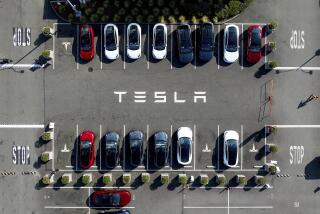Toyota’s electric RAV4 will list for $50,000 when it hits dealers
Toyota said the electric version of its RAV4 sport utility vehicle goes on sale the last week of this month at a price close to $50,000 before government incentives designed to speed the adoption of alternative fuel cars.
The SUV, which has an Environmental Protection Agency rated range of 103 miles on one charge -- roughly 20 to 30 miles more than those of the other electric vehicles it competes against -- is a collaboration with Tesla Motors, the luxury electric car maker based in Palo Alto.
But consumers will pay for those extra miles.
The RAV4 EV has a suggested retail price of $49,800. The electric version of the Ford Focus starts at about $10,000 less but has a range of 76 miles. The Nissan Leaf can be almost $15,000 less but has a range of 73 miles.
Like other so-called battery electric vehicles -- they run just on electricity and don’t operate like the Chevrolet Volt, which also has a gasoline engine to extend the range -- the RAV4 EV is expected to qualify for a $2,500 rebate through the Clean Vehicle Rebate Program in California and is eligible for a $7,500 federal tax credit. The vehicle also gets that coveted car pool lane permit sticker.
Toyota will offer some financial incentives to buyers, including a 1.9% loan rate and a 36-month lease option at $599 a month with $3,499 drive-off.
Still that’s more expensive than what Honda wants for its electric Fit, which is available for lease only. The Fit’s 36-month, 36,000-mile lease will cost $389 a month plus taxes with no down payment and it includes collision insurance. It has a range of 82 miles per charge.
Sales of electric vehicles have been slow, and Toyota doesn’t expect the RAV4 EV to be a high-volume car. It plans to offer just 2,600 units through 2014.
ALSO:
Autos sales shift to smaller cars
Follow me on Twitter (@LATimesJerry), Facebook and Google+.
More to Read
Inside the business of entertainment
The Wide Shot brings you news, analysis and insights on everything from streaming wars to production — and what it all means for the future.
You may occasionally receive promotional content from the Los Angeles Times.











